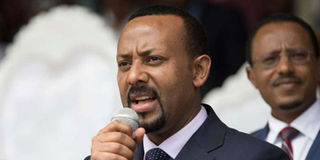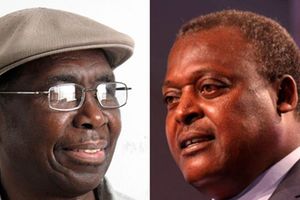Premium
Ethiopia reopens embassy in Eritrea as relations warm

Ethiopian Prime Minister Abiy Ahmed.
What you need to know:
Eritrean President Isaias Afwerki and Ethiopian Prime Minister Abiy Ahmed signed a peace pact in July.
Abiy, Isaias and Somali President Mohamed Abdullahi Mohamed have signed an agreement to "build close political, economic, social, cultural and security ties".
It remains unclear when the heavily militarised Ethiopia-Eritrea border will formally open or when Ethiopian forces will withdraw from the disputed areas.
ADDIS ABABA,
Ethiopia reopened its embassy in the Eritrean capital on Thursday, state media reported, the latest step in restoring ties after the two nations ended decades of conflict.
Eritrean President Isaias Afwerki and Ethiopian Prime Minister Abiy Ahmed signed a peace pact in July, ending the hostilities that began with a two-year border war in 1998 and degenerated into 18 years of stalemated relations.
CLOSE TIES
Abiy had arrived in Eritrea on Wednesday for his second visit since taking office, inspecting the Red Sea nation's two main ports before travelling to the capital Asmara.
"Ethiopia's Prime Minister Dr Abiy Ahmed and Eritrea's President Isaias Afwerki reopened the embassy in a brief ceremony," Ethiopia's state-affiliated Fana Broadcasting Corporate reported on Thursday.
Abiy, Isaias and Somali President Mohamed Abdullahi Mohamed, who joined the leaders in Asmara, had on Wednesday signed an agreement to "build close political, economic, social, cultural and security ties", according to Eritrea's information ministry.
Also on Wednesday, an Ethiopian cargo ship arrived in Eritrea's Massawa port to transport zinc to China, marking the formal reopening of Eritrean ports to Ethiopian trade.
WAR
Eritrea was once a province of its larger southern neighbour and comprised its entire coastline.
After a bloody, decades-long independence struggle, Eritrea voted in 1993 to separate, rendering Ethiopia landlocked.
The two countries then went to war from 1998 to 2000 after a border dispute turned violent.
A 2002 UN-backed boundary demarcation was meant to settle the dispute for good, but Ethiopia refused to abide by it and held on to disputed territory meant to be under Eritrean control.
Elevated to the premiership in April, Abiy announced in June that Ethiopia would hand back the disputed areas including the flashpoint town of Badme where the first shots of the border war were fired.
During his visit this week, Abiy also inspected the road leading from Assab, the other major Eritrean port, to the Ethiopian border, his chief of staff Fitsum Arega tweeted.
However it remains unclear when the heavily militarised Ethiopia-Eritrea border will formally open or when Ethiopian forces will withdraw from the disputed areas.





